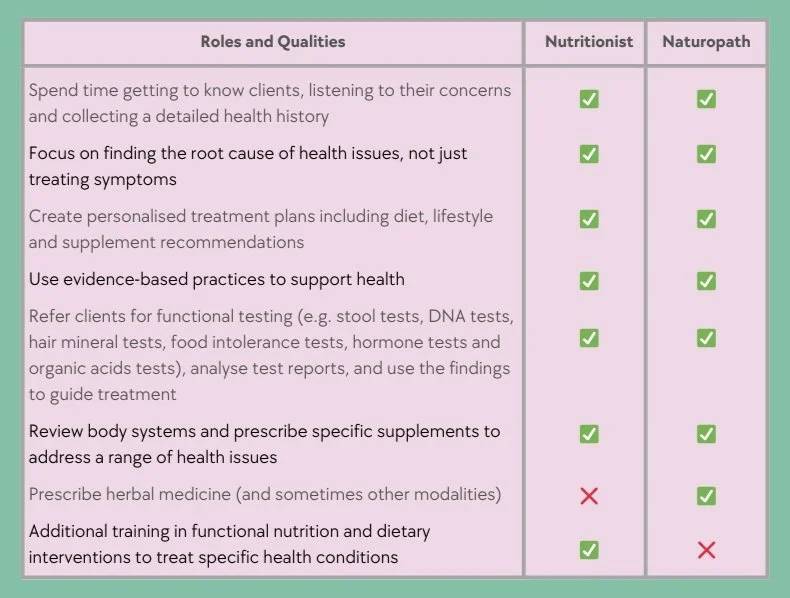What’s the difference between nutritionists and naturopaths?
Did you know that clinical nutritionists share many similarities with naturopaths - particularly in their holistic, root-cause approach - but with a stronger focus on nutrition rather than herbal treatments?
There’s a misperception that nutritionists just offer dietary advice and create meal plans but there is actually so much more to what we do.
Like naturopaths, nutritionists:
look for the root cause of health issues, rather than simply treating the symptoms
spend time getting to know clients, listening to their concerns and collecting a detailed health history
refer clients for blood tests and a range of functional tests, including stool tests, DNA tests, hair mineral tests, food intolerance tests, hormone tests and organic acids tests
analyse pathology results, comparing them with optimal ranges and using the findings to guide treatment
prescribe quality nutritional supplements, specifically selected to meet each client’s individual needs
Naturopaths and nutritionists even do many of the same subjects in their training!
If you’re interested in herbal treatments, a naturopath is the way to go. However, if you're looking for a holistic approach without herbs, I highly recommend consulting a nutritionist.
Important clarification: The above applies only to qualified nutritionists (those with an Advanced Diploma or Bachelor degree), not social media influencers or people claiming to be a ‘nutritionist’ after completing a three month online course!
I’d also like to take this opportunity to answer a question that pops up regularly: Is a dietitian the same as a nutritionist?
In Australia, both dietitians and nutritionists work in the field of food and health, but their roles, training and approaches to nutrition can differ significantly. Many dietitians are also trained as nutritionists; however, the traditional dietitian role typically follows a more clinical approach, focusing on managing medical conditions like diabetes, eating disorders, kidney disease, obesity and allergies.
In contrast, nutritionists - particularly those with a functional or integrative approach - offer highly personalised treatment programs with a focus on prevention, identifying root causes and optimising wellbeing, rather than simply managing conditions.
This distinction is especially important for people seeking alternatives beyond standard dietary advice - whether it's understanding how hormones impact metabolism, managing food intolerances without restrictive diets, or using nutrition to improve energy levels and overall vitality. Nutritionists are particularly well-suited to exploring these areas, especially for those seeking a more holistic, preventative approach to health.
As a passionate advocate for my profession, I hope this has helped clarify the important role nutritionists play in empowering people to use nutrition for optimal health and wellbeing!

